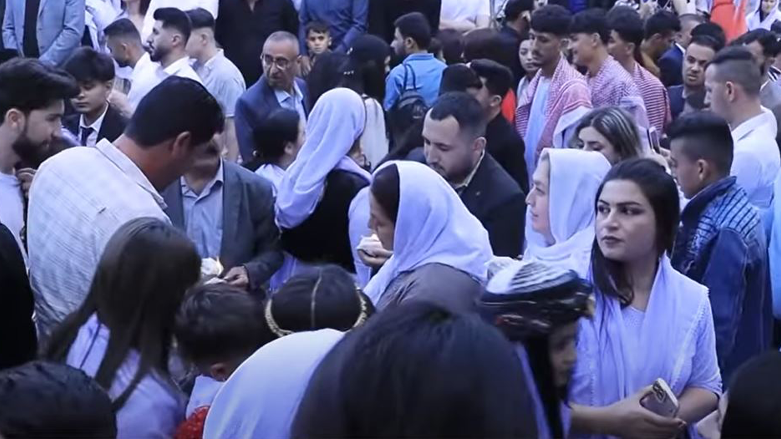Colorful decorated eggs are scattered across the land to celebrate Yezidi New Year

ERBIL (Kurdistan 24) – Every year on the third Wednesday of April, Yezidis celebrate their New Year—named Red Wednesday or Charshema Sor in Kurdish.
The Yezidis perform a variety of ceremonies to commemorate the new year.
For example, in the morning of New Year’s Day, Yezidi farmers go into their fields to spread eggshells to receive blessings.
Mam Kurtan Khurzi, a Yezidi farmer, explains that they perform the same rituals as their ancestors to keep up their traditions. After decorating the eggs, they spread the shells across their lands.
According to the Yezidis, the planet Earth was created on Red Wednesday, and they attribute the coloring of the eggs to the Earth's abundance.
Last night, hundreds of young and old Yezidis celebrated Red Wednesday in Lalish, located in a valley in the Shekhan district, about 40 kilometers from Duhok.
Several hundred candles were lit at the ancient temple of Lalish. These candles mark each day on the Yezidi calendar.
Sivo Derbas, a Kurdish Yezidi artist who returned to the Kurdistan Region from Europe, says he prefers to celebrate the holiday in Lalish, although celebrations take place in Europe as well.
Sabah Elias, a Yezidi from Sinjar, said “I came to Lalish with my friends and family to participate in the New Year celebrations. All Yezidis come together on this day.”
There are approximately 500,000 Yazidis living in Iraq. More than 70%, or 360,000, of them, are still residing in camps in the Kurdistan region, according to figures released by the Kurdistan Regional Government (KRG). Another 100,000 Yezidis live outside Iraq.
Thousands of Yezidi women were sexually enslaved by the Islamic State of Iraq and Syria (ISIS), which was defeated in 2017 by Kurdish and Iraqi forces, with the support of the US-led coalition.
The Kurdish-Kurmanji-speaking community has suffered at least 72 genocides.
European countries, including Germany, have hosted a significant number of Yezidis fleeing violence. Nearly 10,000 Yezidis were killed or kidnapped by ISIS.
The United Nations later recognized the atrocities against the Yazidi people as genocide.
More than 3,500 Yezidis have been rescued so far, according to the KRG.
